vorige
week 1
Pop culture brainstorm
Ways to incorporate pop culture / music in your craft
Themes See what the general public is interested in Find new ways to share your work (like when TikTok first emerged) Be exposed to new ideas - video essays on Youtube, different interpretations of works of art, literature, philosophies Video clips Be inspired to try new hobbies, which might enter your practice (like when I learned to knit / crochet) Anything could inspire a new idea / way of thinking
Personally, I find song lyrics and melodies tend to inspire new thought processes, even though I am in no way musically gifted. One album (more specifically a song on said album) made me realise I actually really wanted to attend art school in the first place. I ended up making a series of photos exploring a specific place in the story of the album
(link) photos (0:45 - 3:34)
Recently, a favourite artist of mine (Hozier) released a new album (Unreal Unearth) which explores the circles of Hell, as they were described in Dante Alighieri's Inferno. I have really been wanting to do more research about that album.
week 2 & 3 & 4
Unreal Unearth research
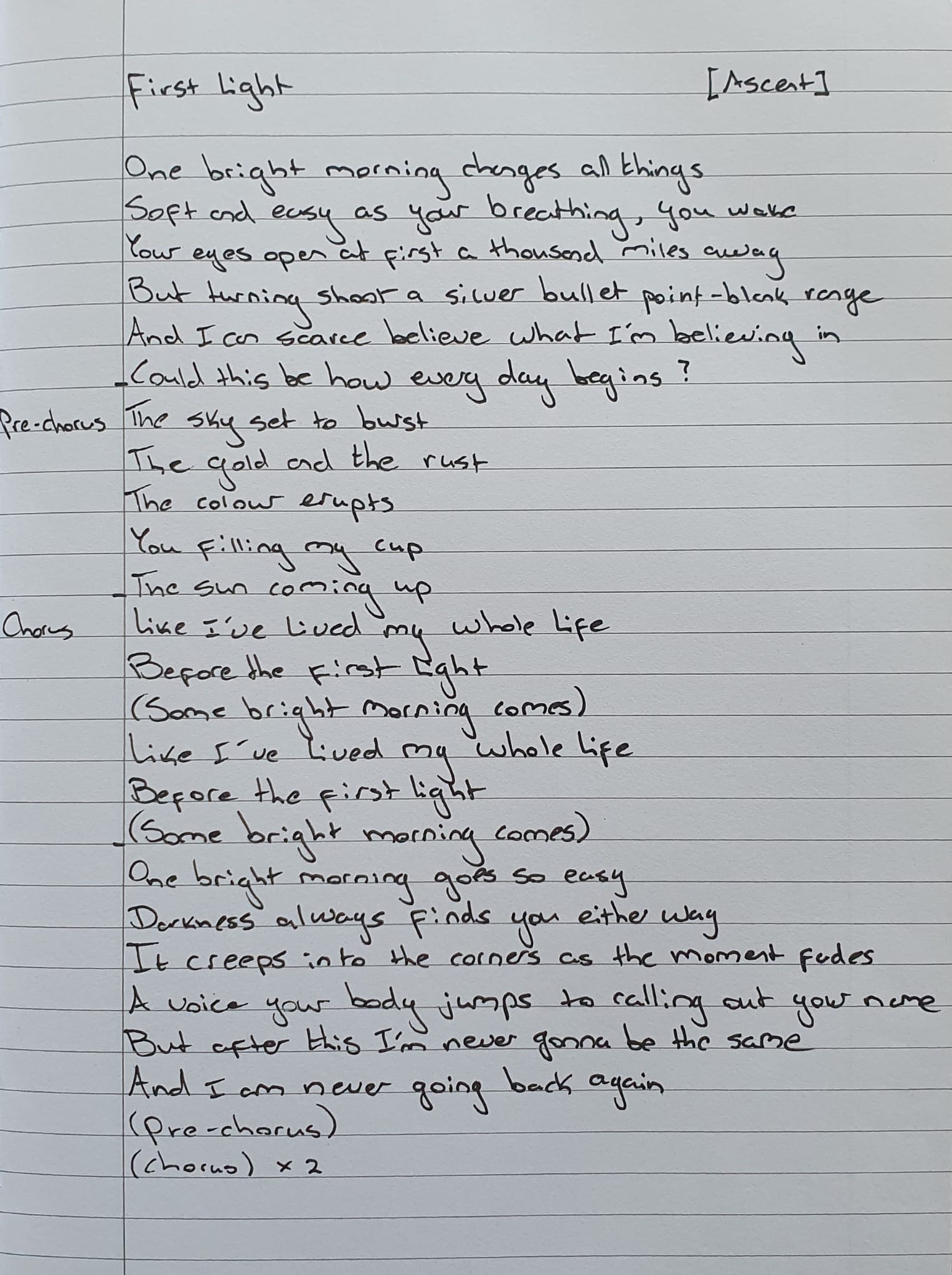
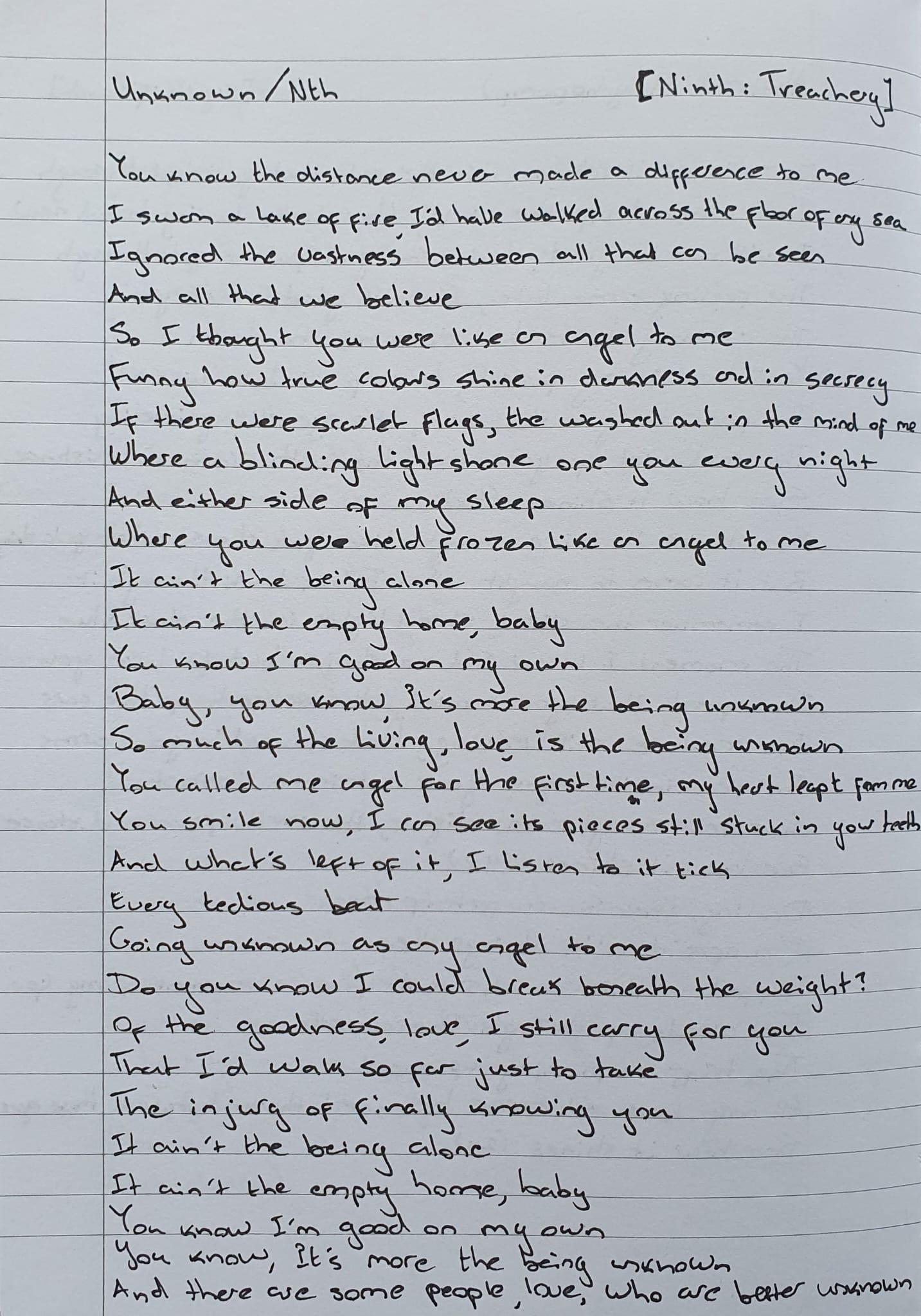
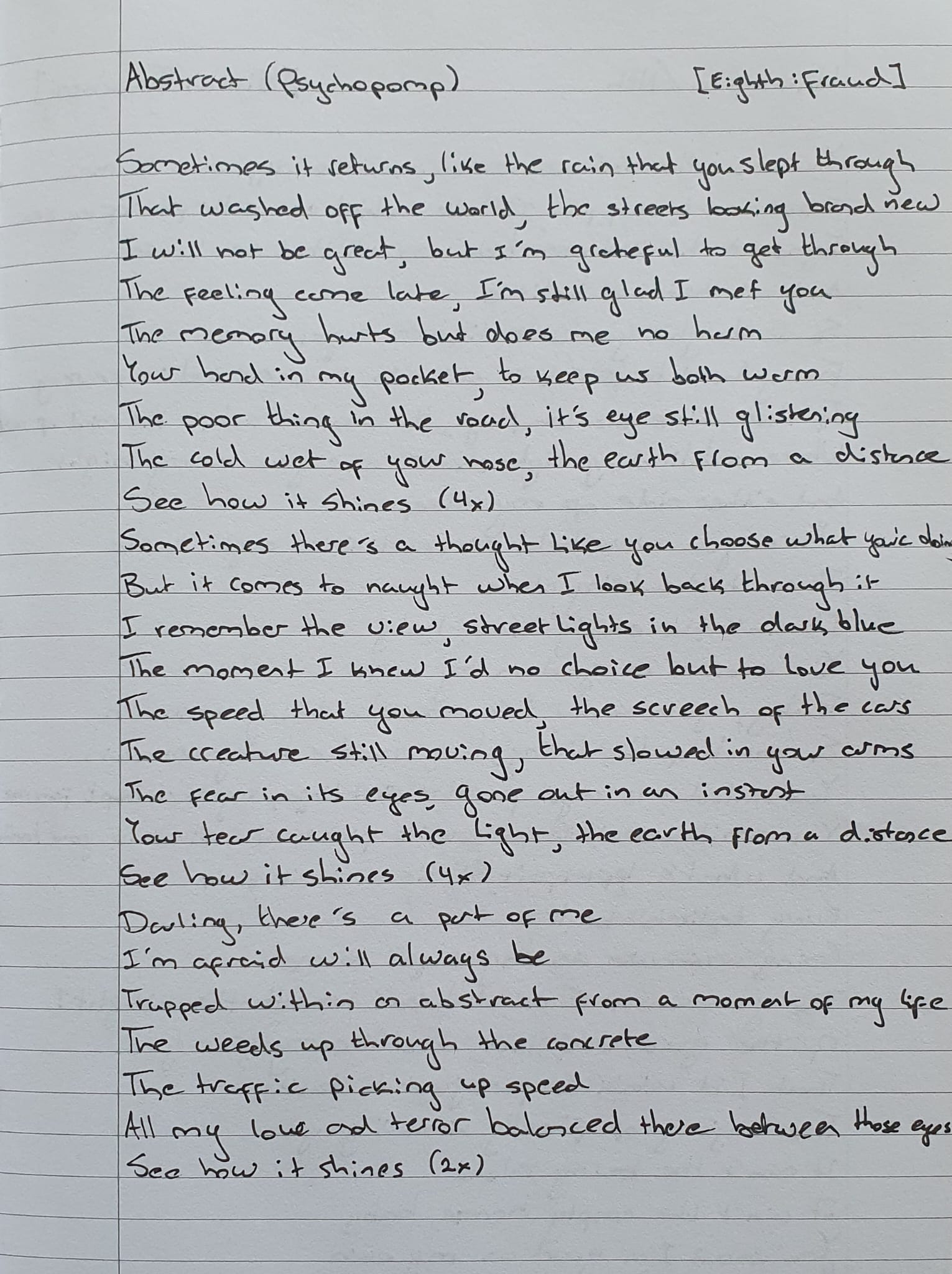
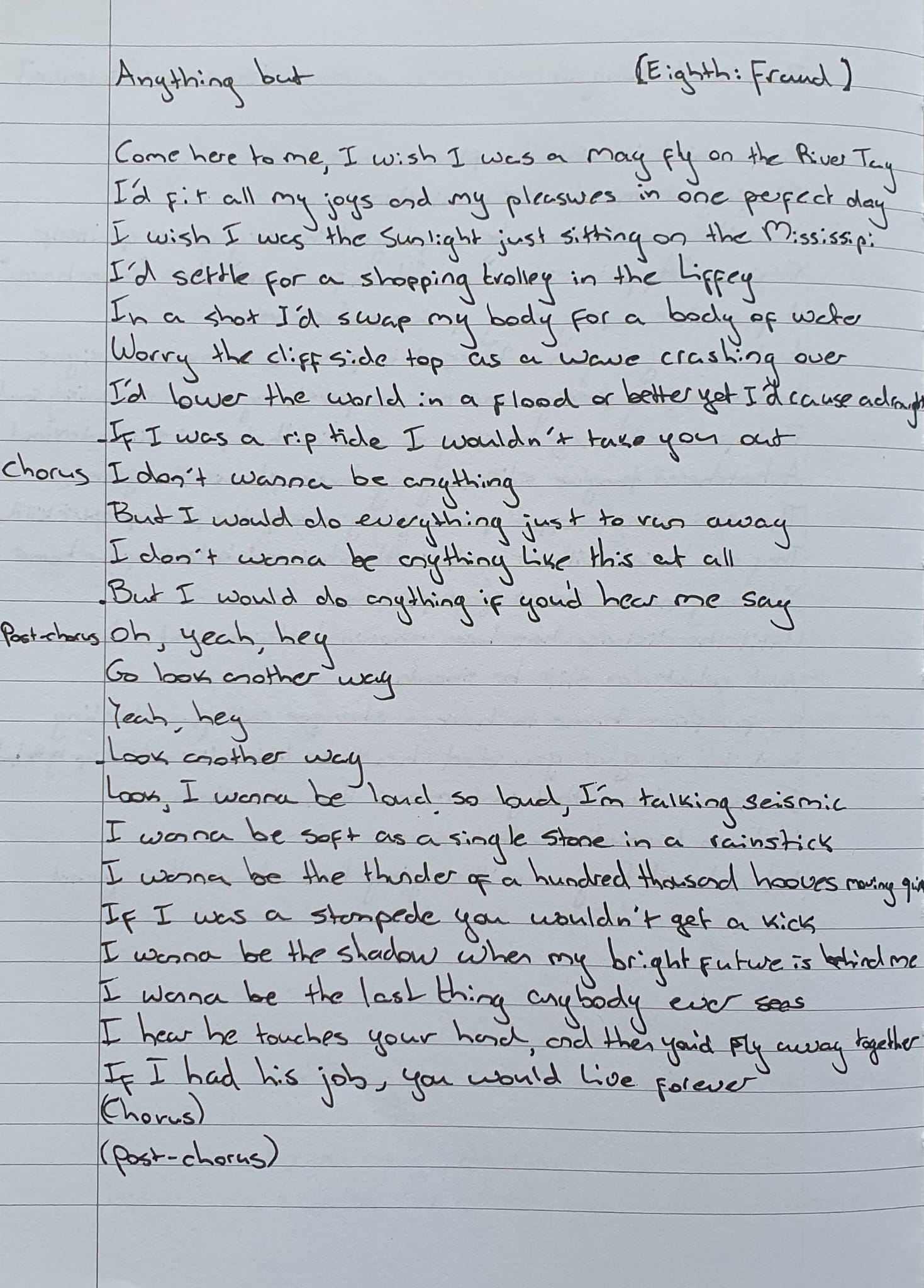
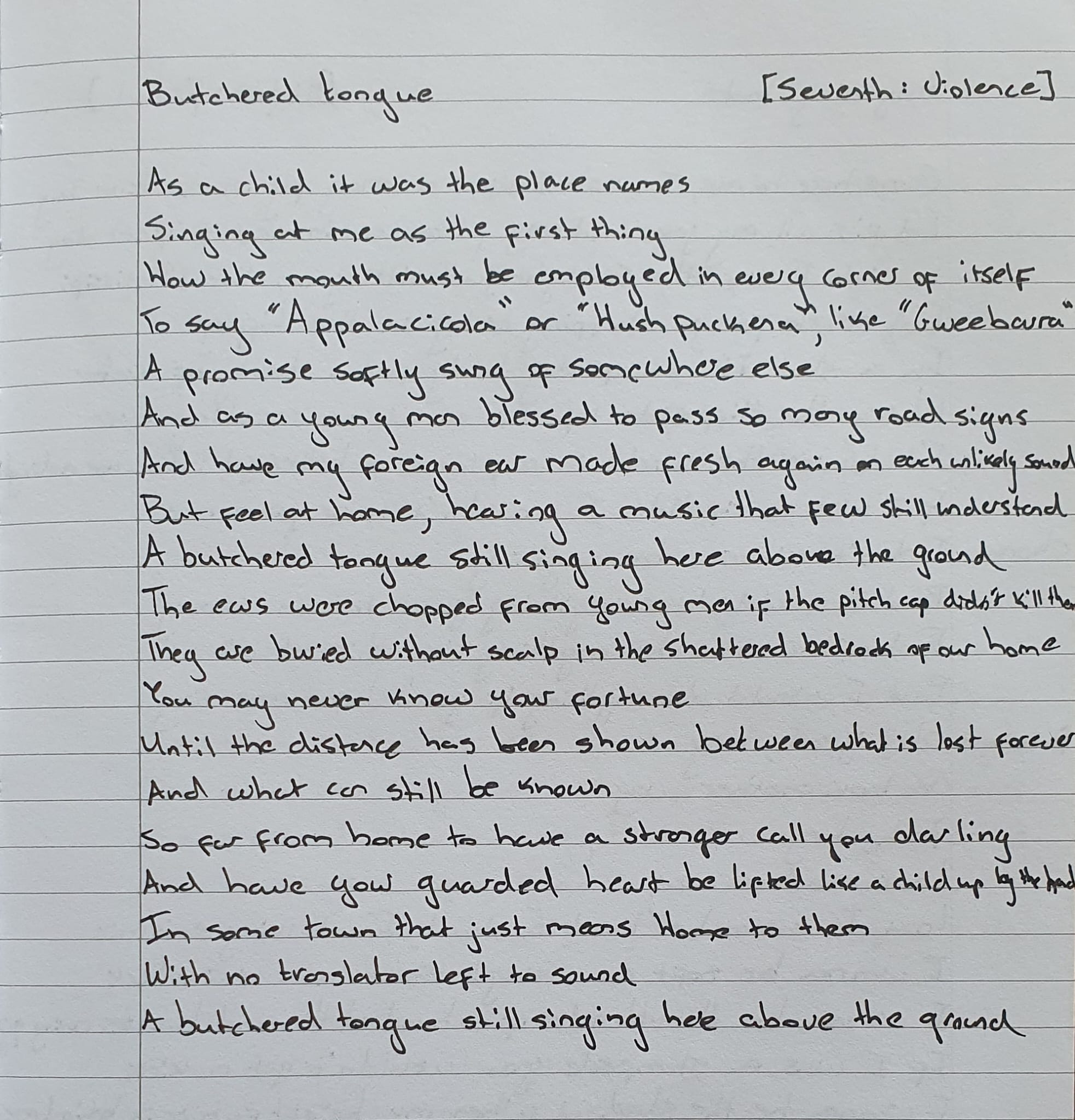
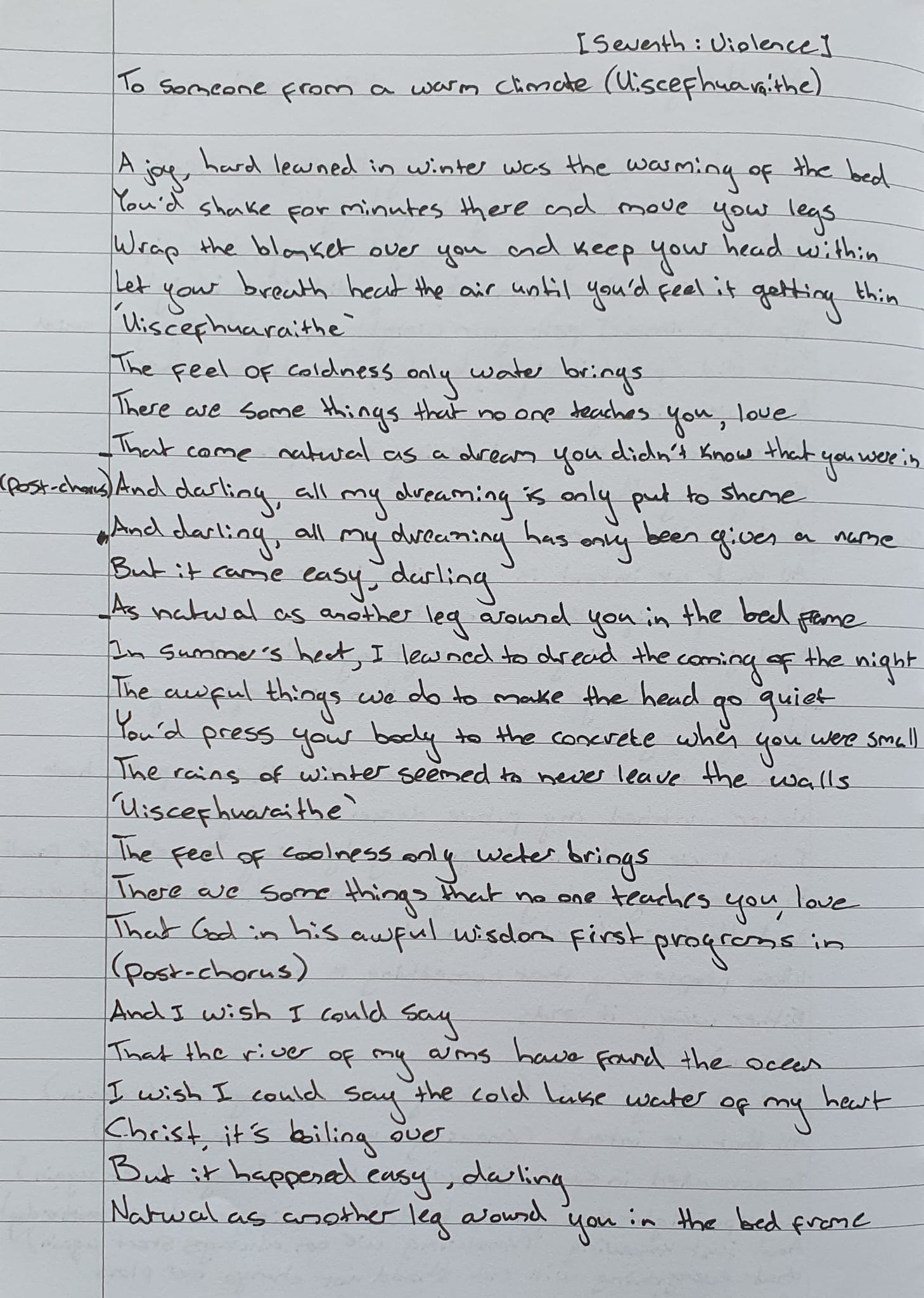
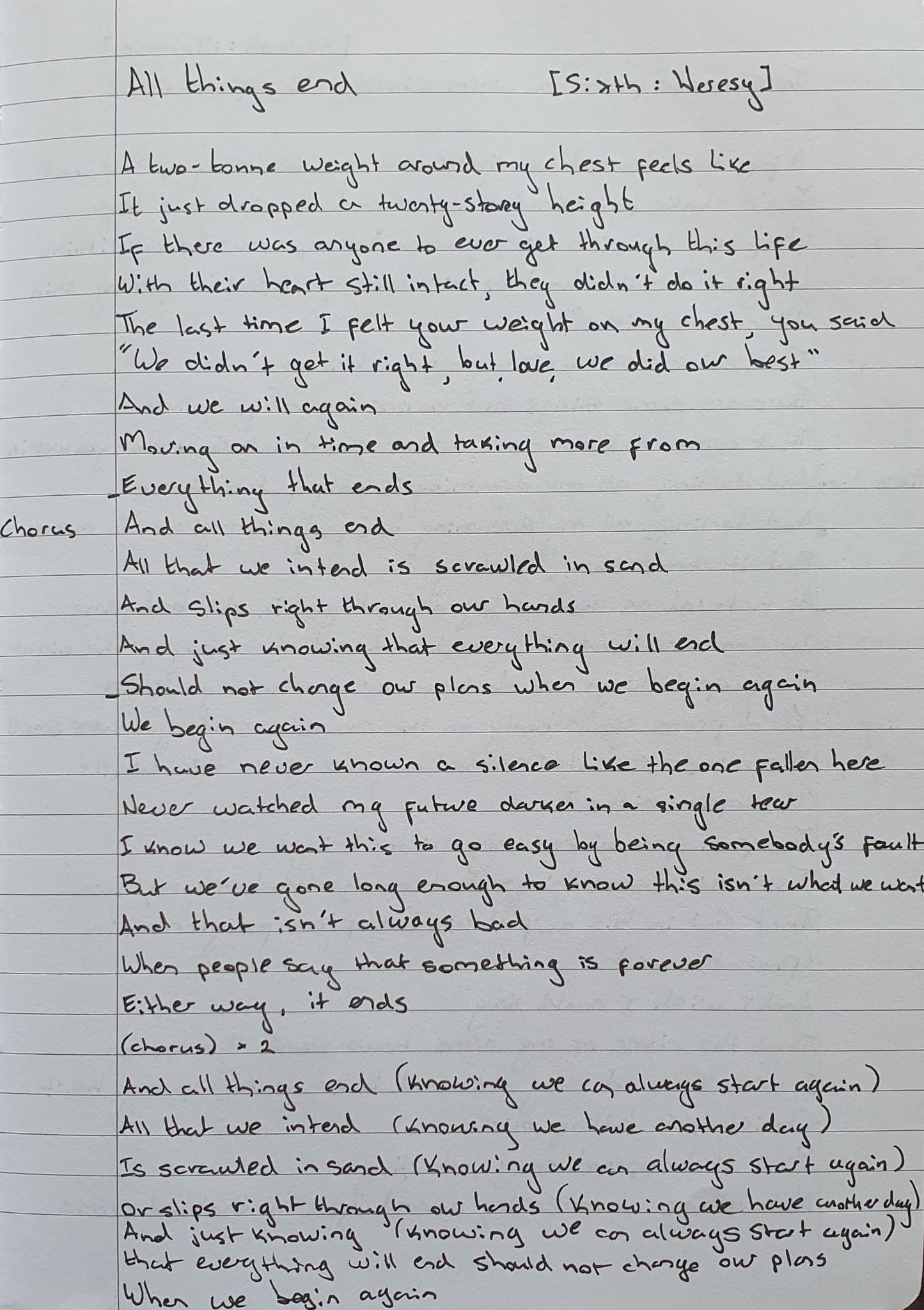
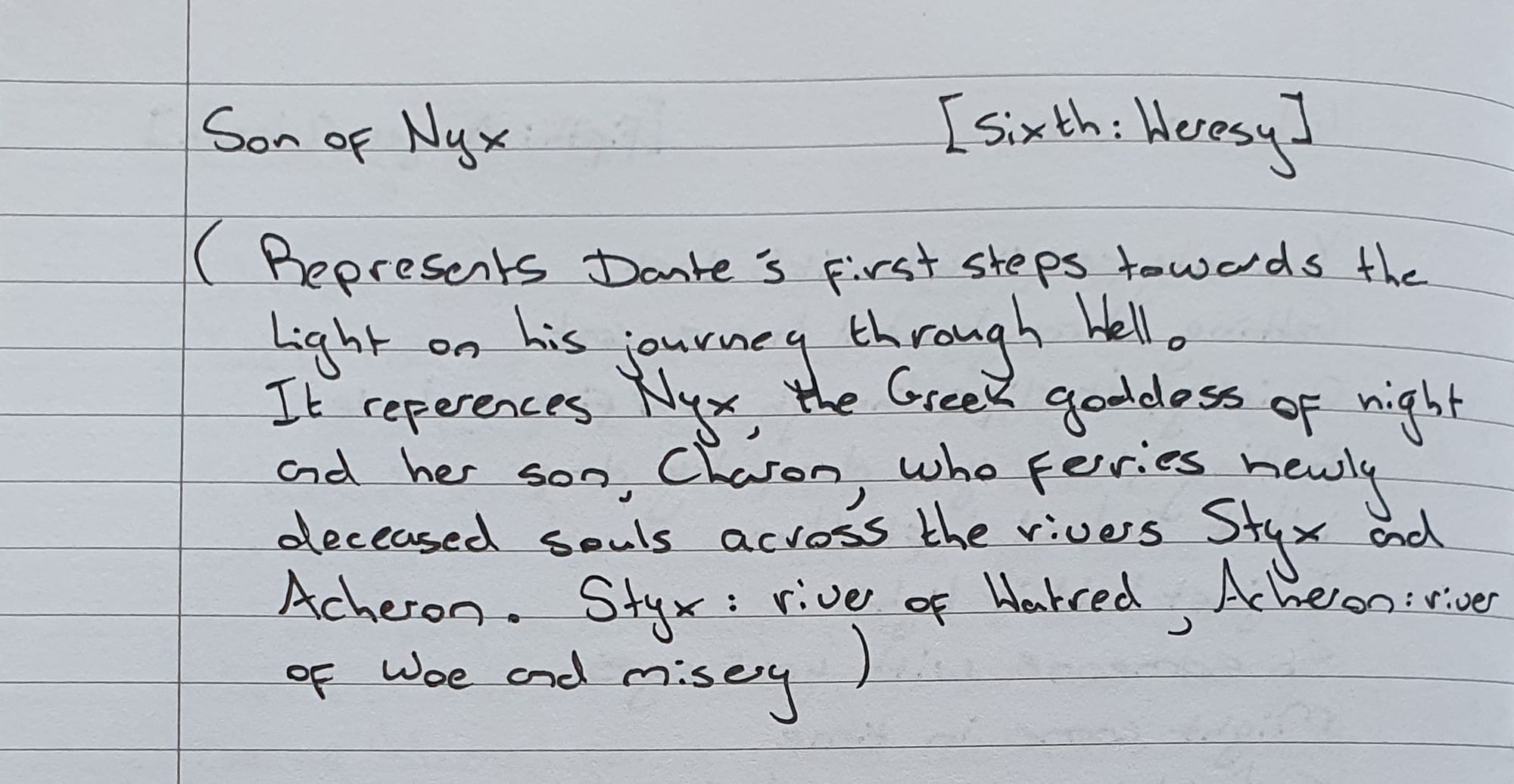
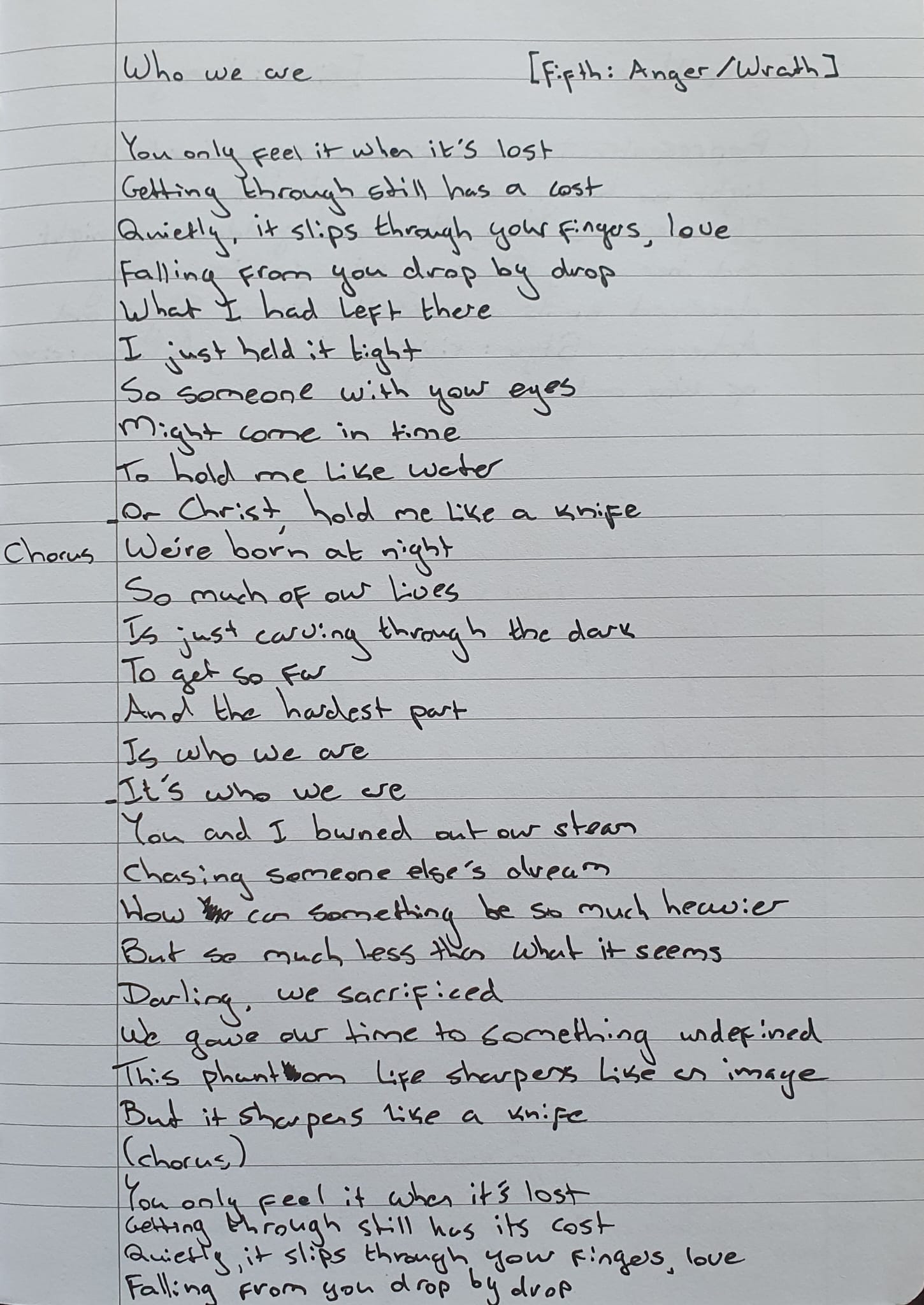
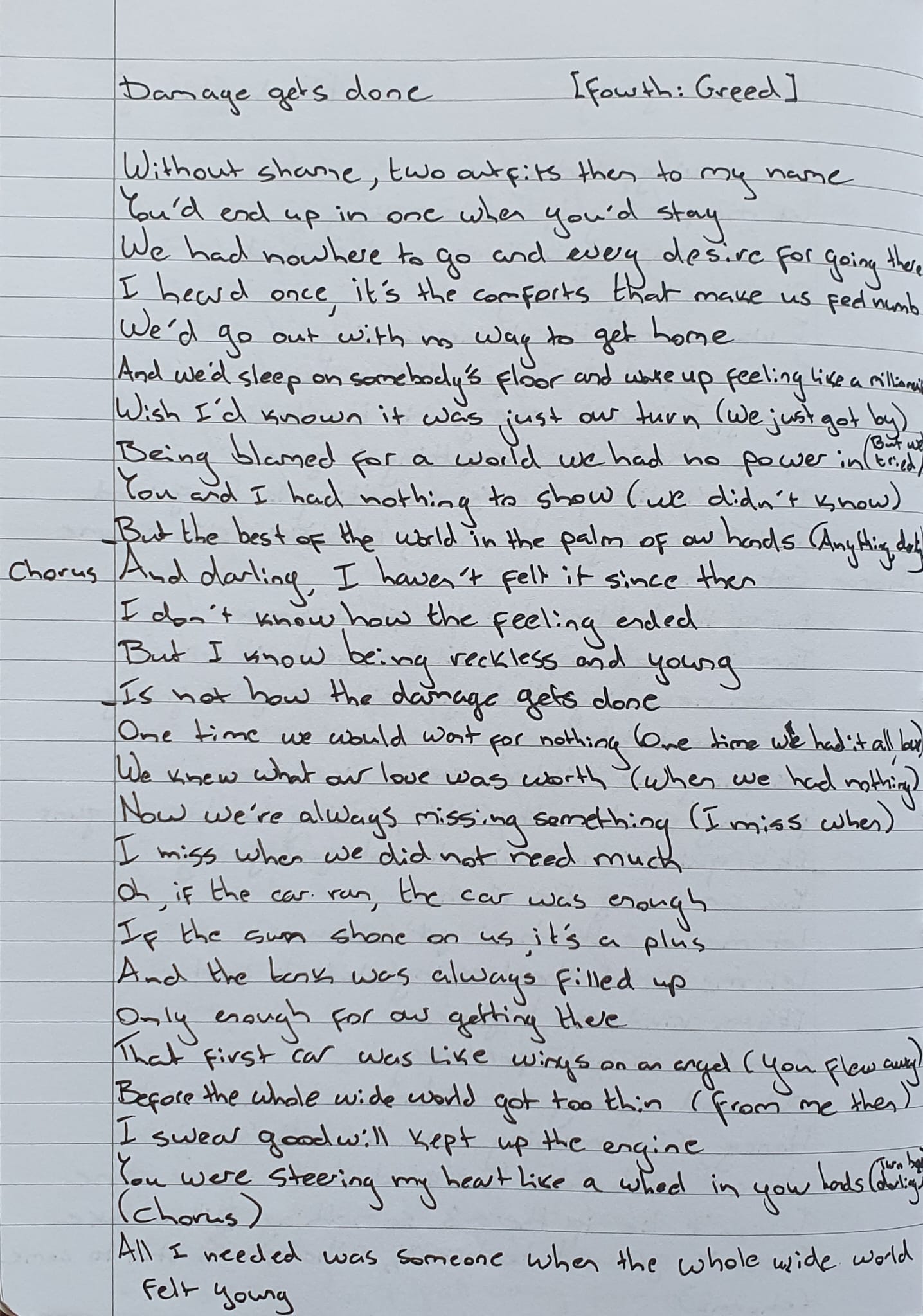
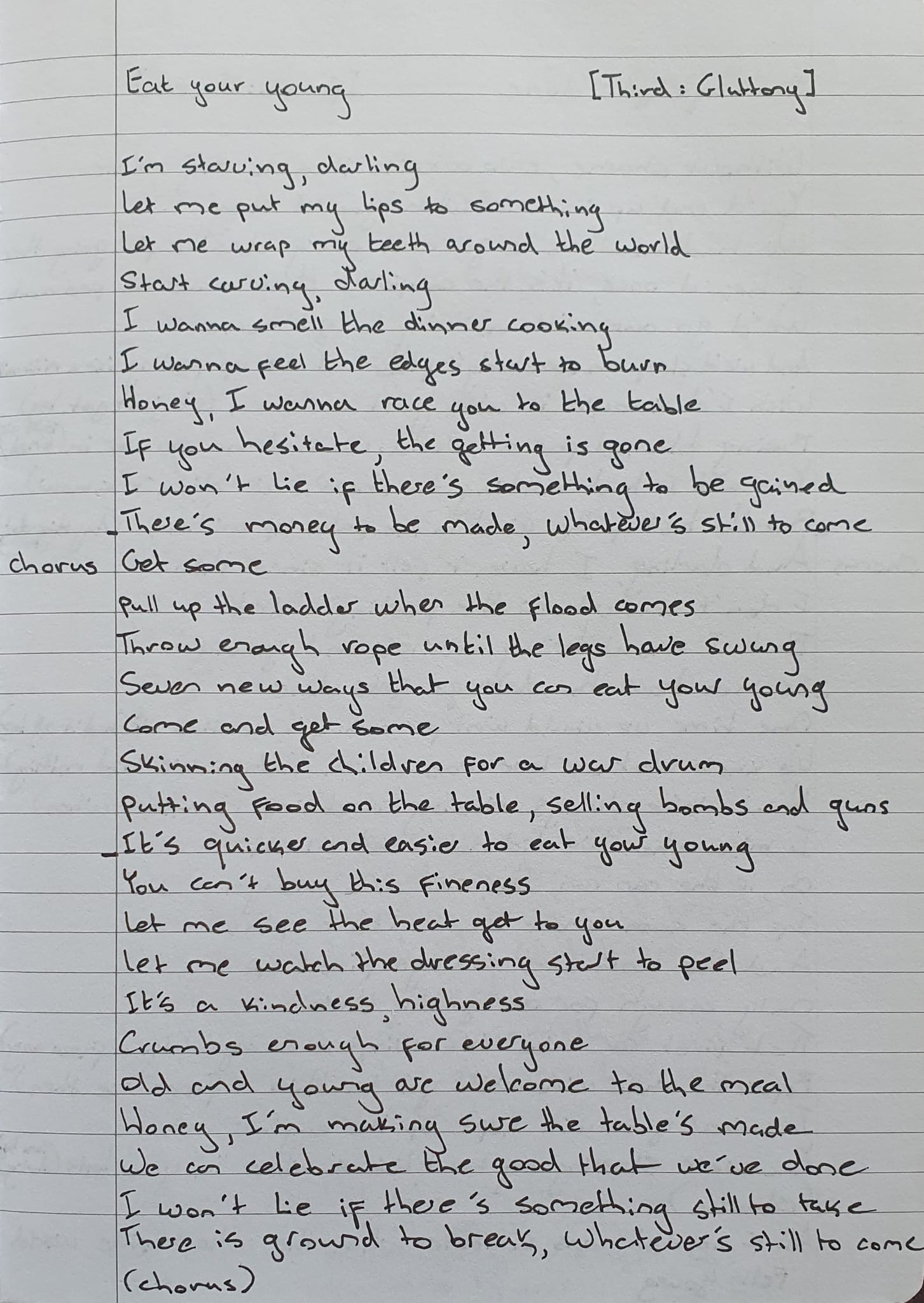
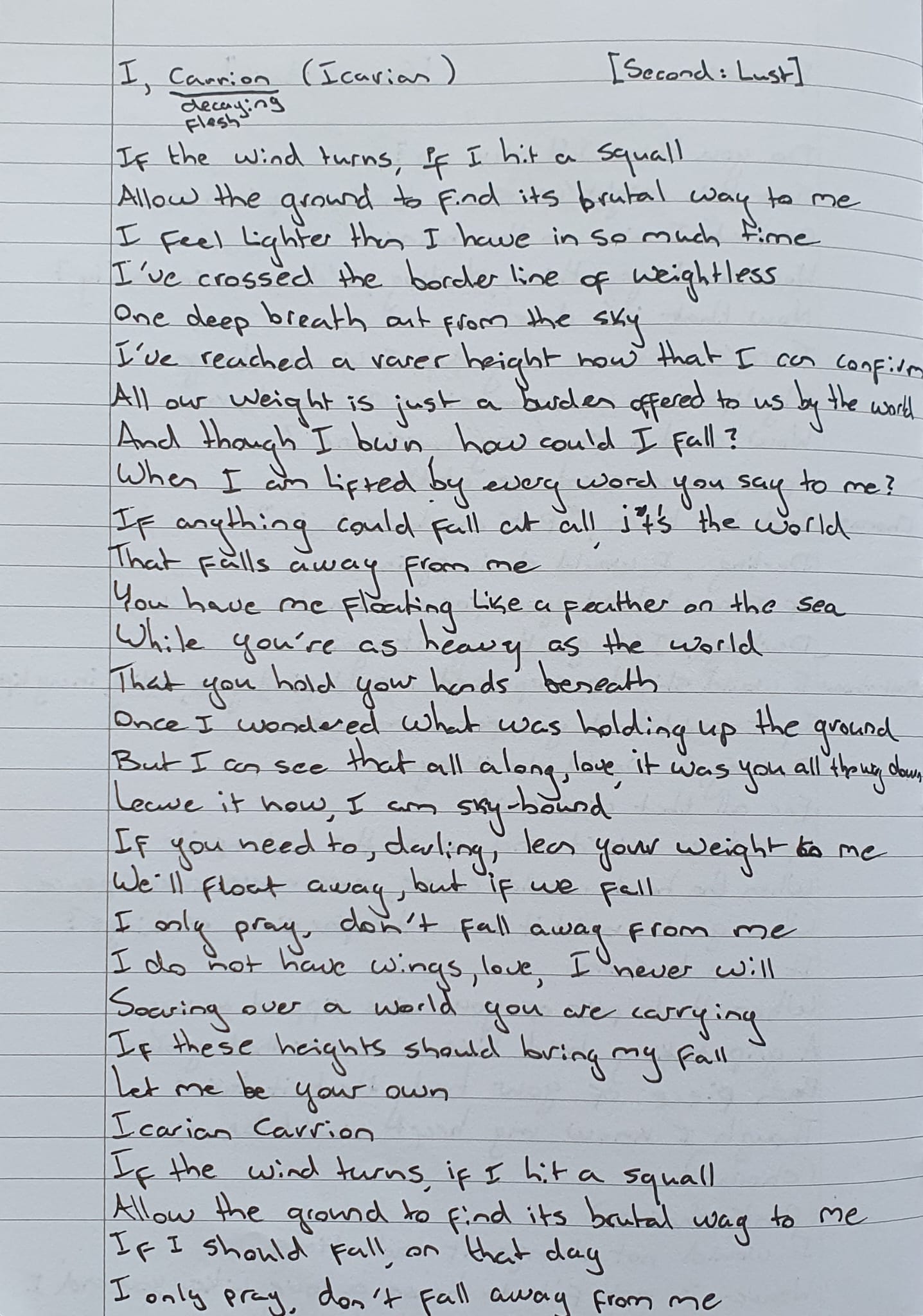
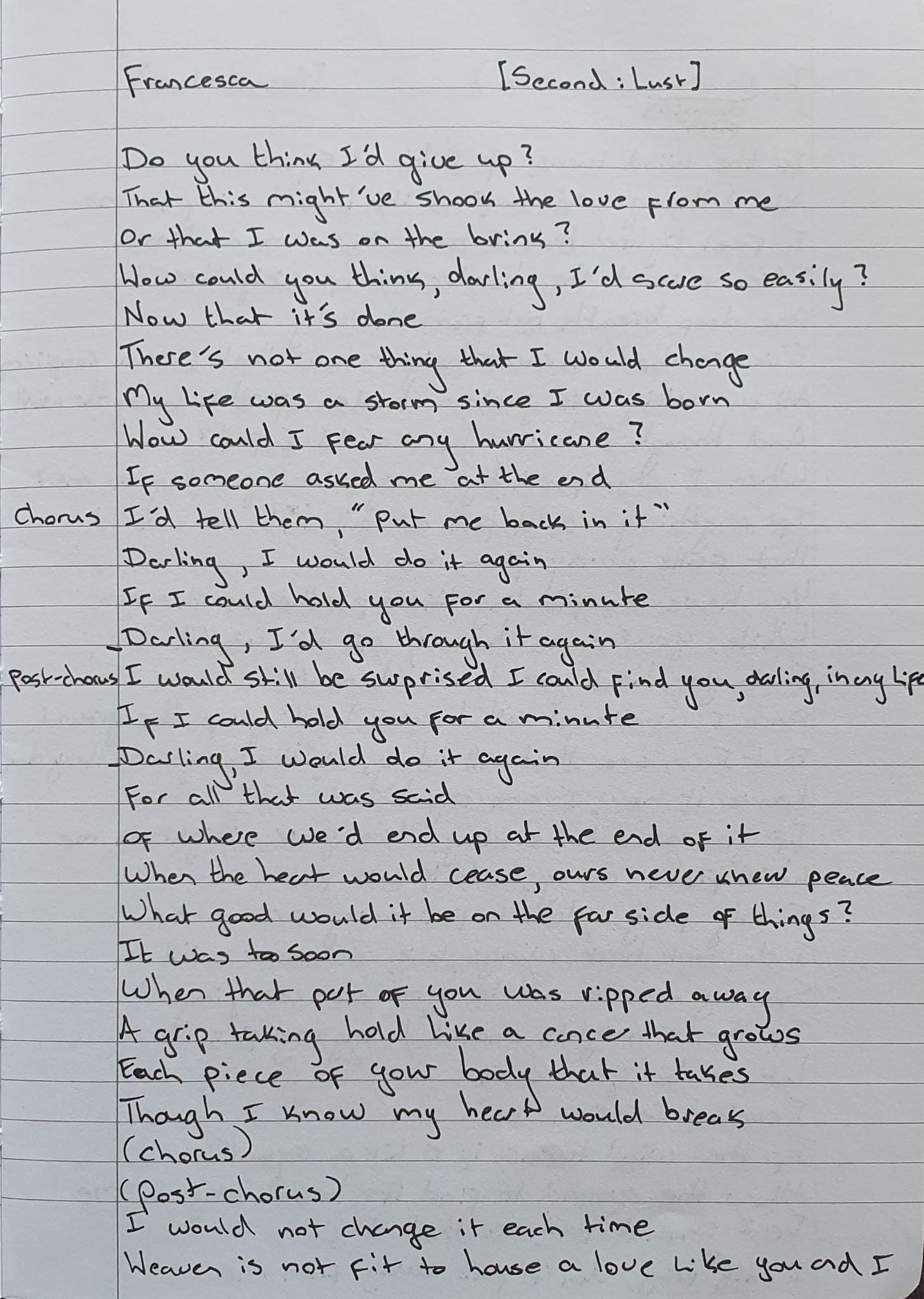
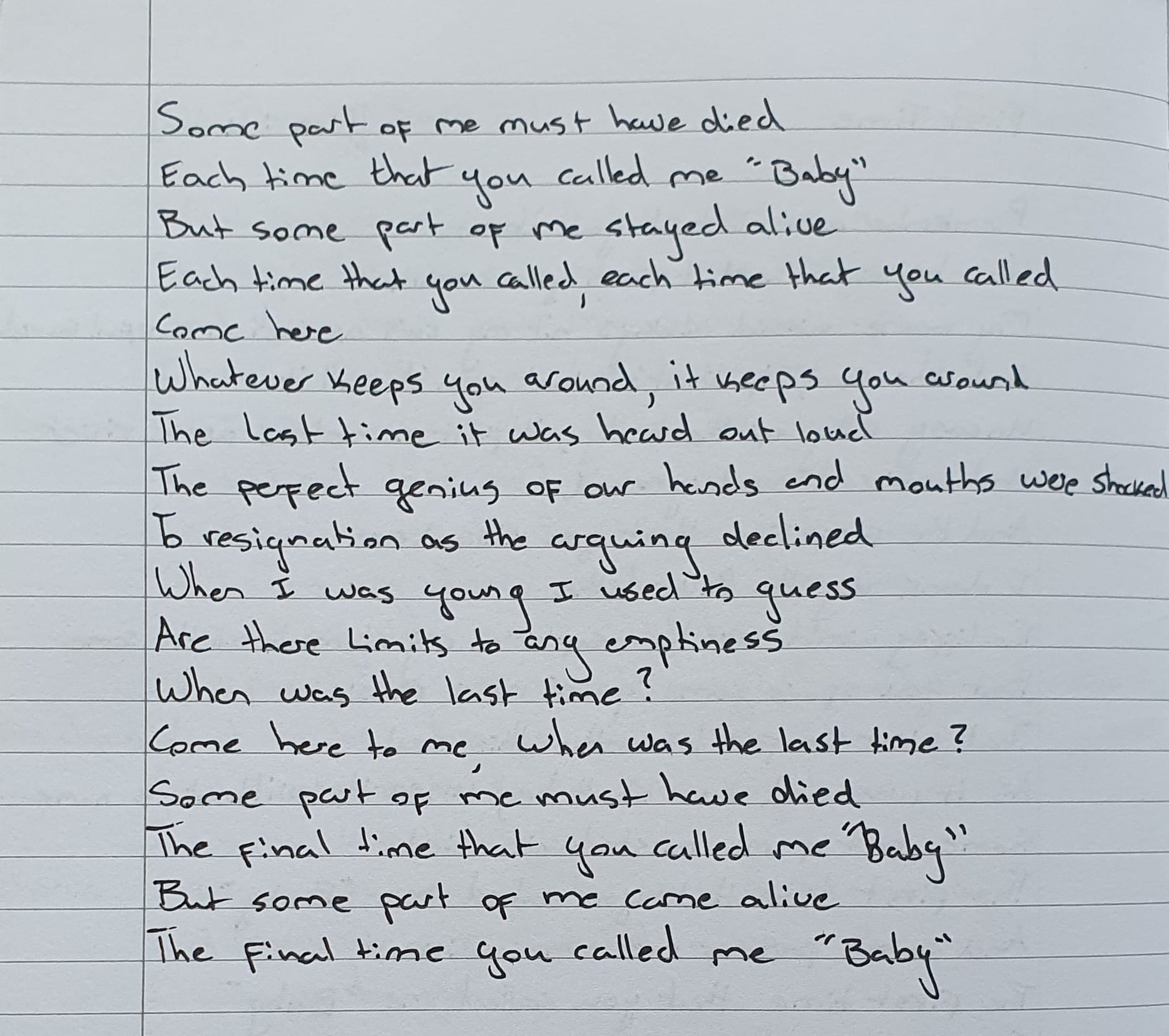
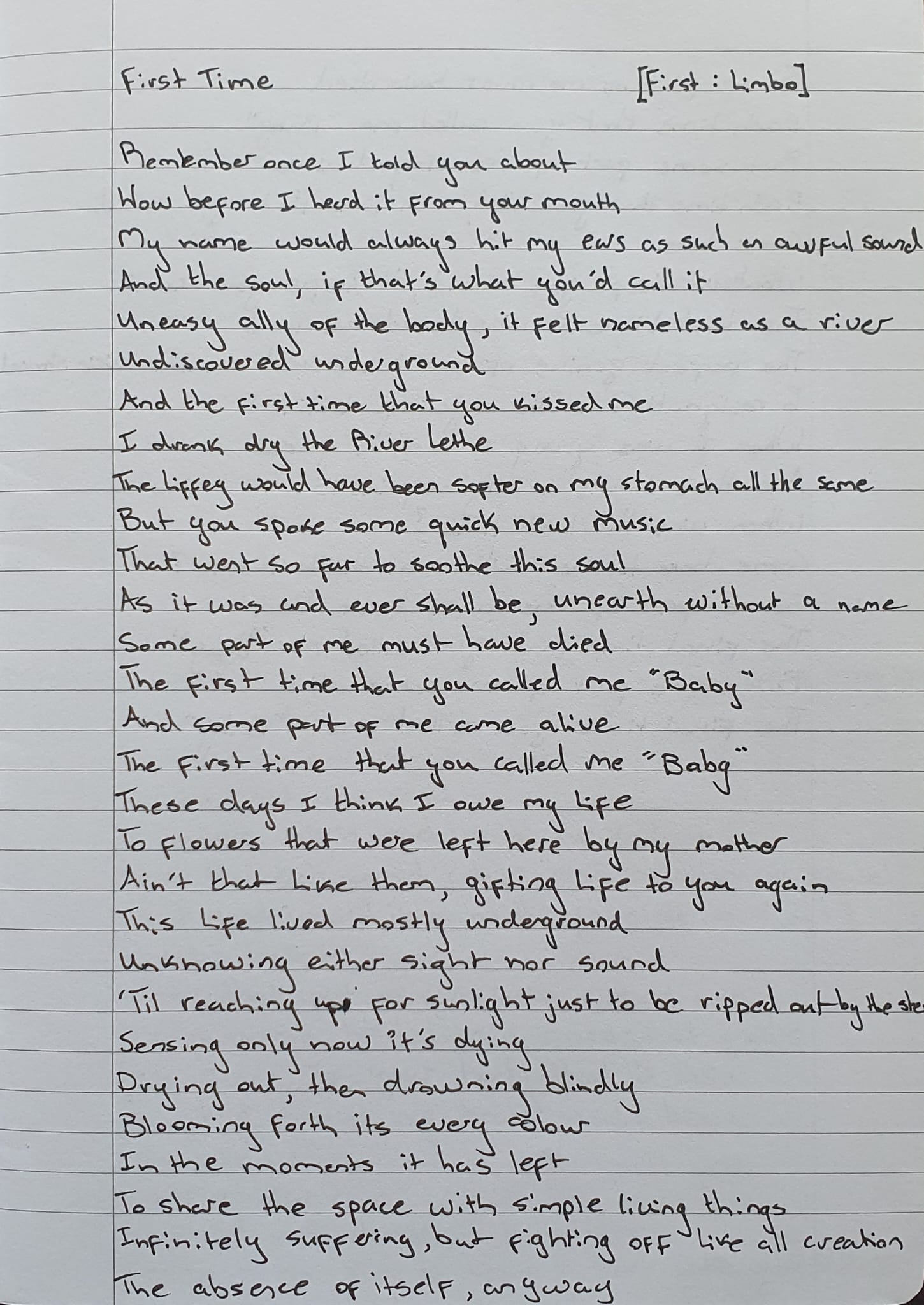
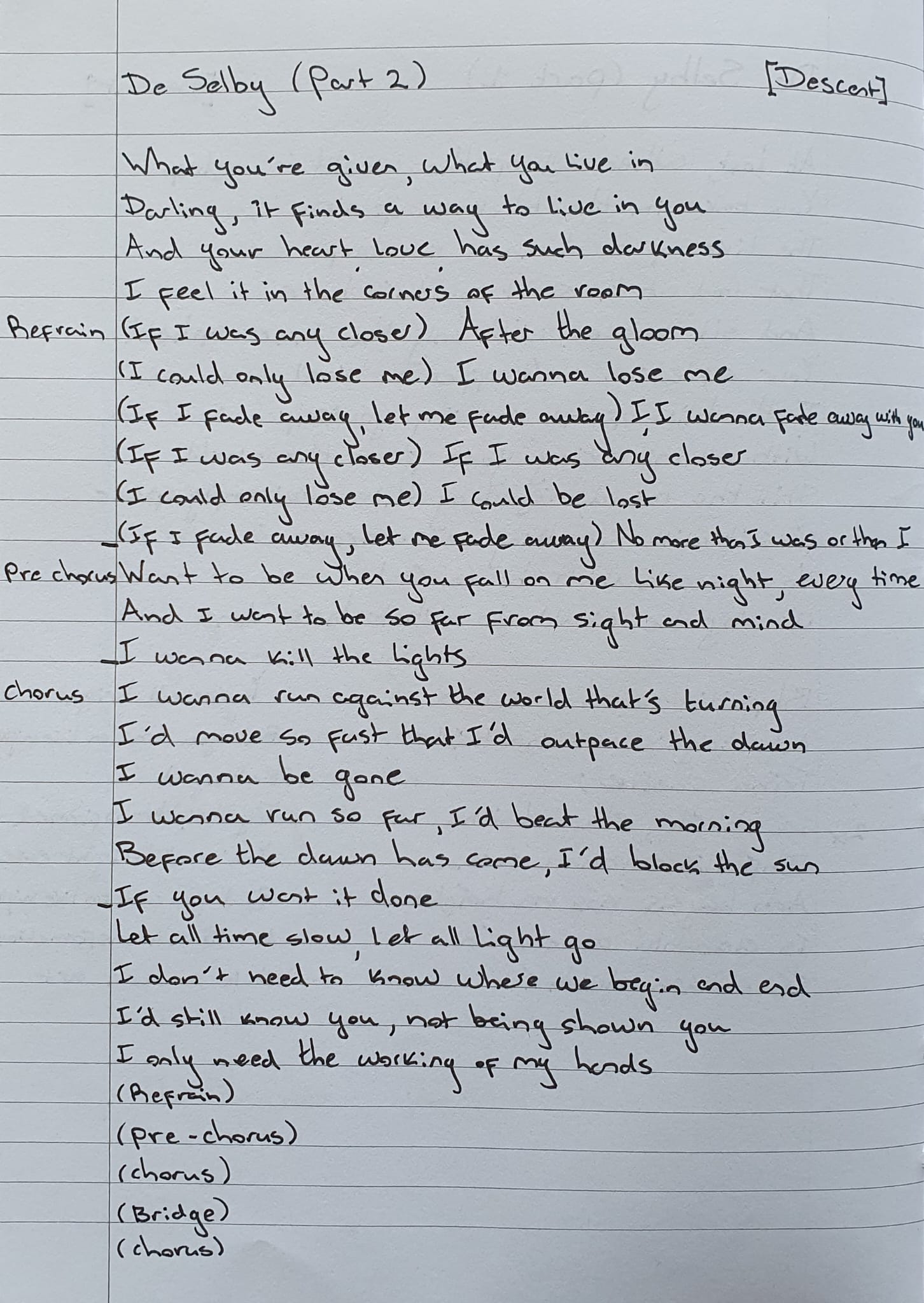
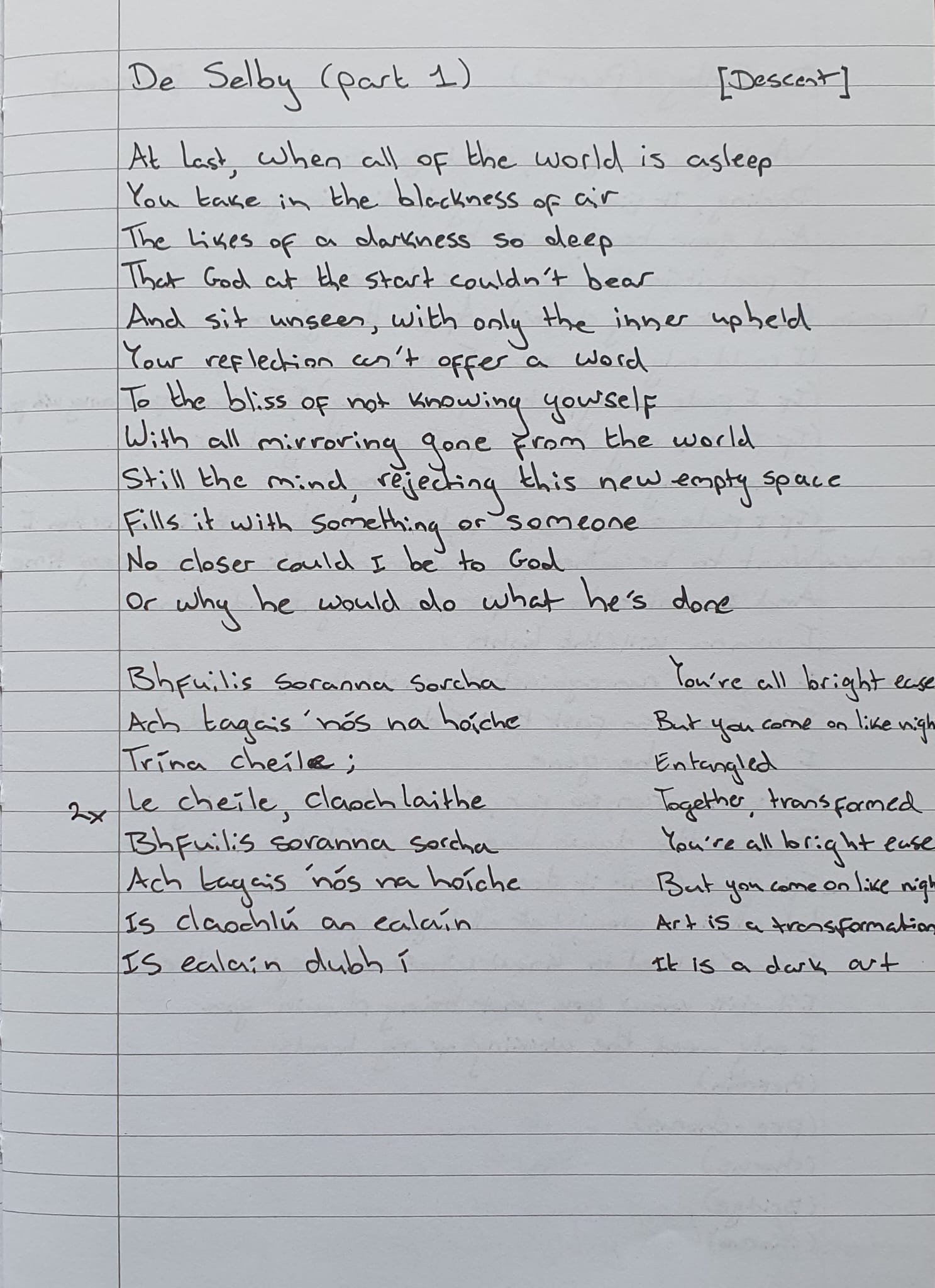
1 Descent
De Selby is a fictional philosopher and scientist from the book The Third Policeman (Flann O'Brien). According to Hozier, this person is "part scholar, part lunatic", and views the world in a dream-like sort of way. This song is a reflection on (the descent into) darkness. De Selby states something like, if I can't see my hand in darkness, my hand and the dark become one and the same.
Hozier uses this idea to reflect on the concept of creation. The mind rejects emptiness. So this is kind of De Selby's way of forgiving God for creating the world, as the idea of nothing would be unbearable.
The section in Gaelic expands on this idea by making it into a love song, where, if you cannot see where one ends and the other begins, there is a transformation of some sort.
Another thought by De Selby is that you cannot see yourself in the mirror, only a younger version of yourself. So he concludes that if you put a lot of mirrors in front of each other, you will not be able to see yourself at all anymore.
2 Descent
This song expands on the idea of transformation and metamorphosis.
"What you're given, what you live in, darling, it finds a way to live in you" references the atomic theory as explained in The Third Policeman, where all things consist of moving particles, so objects that often come into contact take on characteristics of that other object. The example that is given is a man that often rides a bicycle starts to take on traits of a bicycle (turns into one), and vice versa. So this person will start to lean on things while standing still, and the bike will suddenly appear indoors on a rainy day.
"And your heart, love, has such darkness, I feel it in the corners of the room" again covers the idea of "in the dark, everyone is everything".
4 Lust
The people in this circle were governed by lust in their lifetime. This is the first circle where people are punished, which is done by being trapped in a storm (which symbolises the nature of the sin).
When Dante passes through this circle, he meets Francesca da Rimini and Paolo Malatesta, who were murdered as a result of their affair (Francesca was married to Paolo's brother). During their conversation, she clarifies that she has no regrets about how things turned out. This song is about their love.
"Do you think I'd give up? That this might've shook the love from me?", even though the punishment is for being guided by lust, the feelings are steady
"My life was a storm since I was born. How could I fear any hurricane?" reference to the storm that runs through this circle of Hell.
"If someone asked me at the end, I'd tell them "Put me back in it""
"Heaven is not fit to house a love like you and I", no matter how genuine their love is, they will never enter Heaven, since they ignored marital vows.
3 Limbo
This circle contains those that did not get into Heaven or Hell, the just that died before Jesus' arrival and unbaptised infants (this second one is debated). This place is not one of torment, but neither one of relief. It symbolises uncertainty, the desire for reaching Heaven.
This song probably describes the state of Limbo towards the person this song is about.
"The first time that you kissed me, I drank dry the river Lethe", the river Lethe runs through the underworld and is also known as the river of forgetting.
"These days I think I owe my life to flowers that were left here by my mother. Ain't that like them, gifting life to you again?" etc., the narrator of this song has passed away (young, as implied by the presence of his mother at his grave). The narrator considers the flowers that are left as his life, the nature surrounding the grave is part of him. The flowers are cut from the stem, so they feel they're also dying, but in the last moments they are colourful. They are still trying to resist their own absence, even if it's useless in the end.
"When I was young I used to guess, are there limits to any emptiness?", the curiosity towards death and what happens after, but also emptiness in life.
5 Lust
This song references the myth of Icarus, son of the famous inventor Daedalus. They were being held prisoner by King Minos of Crete. In order to escape, Daedalus created two pairs of wings, so that he and his son could escape the island. Icarus was warned not to fly too high or the wax that kept the wings together would melt and he would fall. He went too high, etc, etc. The myth is a story of moderation(which works in the context of the circle of Lust).
Carrion is a term for rotting flesh.
"Once I wondered what was holding up the ground, but I can see that all along it was you all the way down", refers to the myths of the titan Atlas whose punishment is holding up the globe and that of Earth being the back of a giant turtle (loosely: "what is that turtle standing on?" "A bigger turtle" "And that turtle?" "It's turtles all the way down").
Hozier: "This song has tried to imagine that he was so enamored and so breathless and so ecstatic in the moment that he felt the air rushing by him, that he never knew he died. And that he sort of woke up, he woke up dead, as we say, and was in complete denial of it, having been in such a place of ecstasy"
6 Gluttony
The circle of Gluttony punishes those who were immoderate with the use of things as food or drink. The punishment here is to forever lie in a dirty mush of rain, snow, mud, etc. to represent the garbage they fed themselves with.
In essay "A Modest Proposal" (1729) by satirist Jonathan Swift a solution for the starvation in Ireland is proposed, namely for the Irish to eat their children, or sell them so they are no longer a burden.
"Putting food on the table, selling bombs and guns", the consumption of food is regulated by the same people who regulate the wars, which ties to the line before "Skinning the children for a war drum". Creating dissatisfaction among the public by keeping food from them, then forcing them to fight a war (in which they may well die) with the promise of a better life once it's over.
7 Greed
Circle of greed holds those who were overconcerned with material things (both those who stored them and who spent them).
This song reflects on the concepts of being young and rash and of actually doing damage to the world. Youths who are reckless do not have enough power in the world to damage it, but are often blamed for what is wrong with it, whereas the people that damage the world are known as being strategic.
"If the car ran, the car was enough", the people in the song didn't use to have many expectations, so anything that was in their favour was only something else to be happy about.
"Now, we're always missing something", the people grew up and are not able to mess around anymore. They have expectations now, meaning the disappointment is harsh when things do not work out. Now they're greedy.
"All I needed was someone when the whole wide world felt young", the expectations extended to having someone to share experiences with.
8 Wrath
In this circle the wrathful and the sullen are punished on the river Styx, by eternally fighting one another and floating just below the surface, respectively.
"This phantom life sharpens like an image, but it sharpens like a knife". A phantom limb is a phenomenon where someone who has lost a limb still feels its presence where it once was, or where it should be. The notion of a phantom life can be interpreted in the same manner. On his journey through Hell, Dante takes a look at his own behaviour in the realisation that he is directly responsible for his fate. In the process of getting to know yourself this way, you may find out you do not actually like who you are ("The hardest part is who we are"). This song might refer to the anger (or sullenness, depending on the person) one feels when realising this.
Hozier: "Something I wanted to get into the album was this idea of being born at night, of starting in complete darkness. It’s a song that starts in childhood in this cold and dark hour, being lost and then just scraping and carving your way through the dark."
9 Heresy
(Entry of the City of Dis - Lower levels of Hell - where people of intellectual sins are held, rather than those who committed sins of passion) Heretics are punished by being trapped in fiery tombs.
This song is probably in reference to the transition between upper and lower Hell, as it contains snippets of all songs on the album, in achronological order.
The son of Nyx (Greek goddess of the night), Charon, is the ferryman of the Underworld. He transports the deceased across the river Styx (Hatred) and Acheron (Misery).
10 Heresy
The idea that nothing is forever might be heresy in itself, as this would imply that God is not forever either.
"If there was anyone to ever get through this life with their heart still intact, they didn't do it right", a heart that is intact might refer to either heartbreak or a kind of darkening of the heart through sin.
"All that we intend is scrawled on sand... And just knowing that everything will end should not change our plans when we begin again", the idea that nothing is forever doesn't mean that those things are not worth having existed. In one iteration of the chorus, the word 'scrawled' is changed to 'built', which refers to the Bible passage where it is mentioned that fools build their houses on sand. This would mean the house will not last based on the lack of a solid foundation. But then according to the song nothing has a solid foundation.
11 Violence
This circle consists of three rings. The outer ring is reserved for those who acted with violence against other people or things, who are punished by boiling in a blood river. The middle ring is for those who were violent to themselves, punished by being transformed into a tree and having harpies pick at them. The inner ring is for the violent against God, nature, or order, left in a desert of burning sand and rain.
This song may be a reference to unknowingly act in violence towards someone else, by not being what this person needs. The narrator is from a cold climate, the intended audience is a person from a warm climate. This latter person may need someone cool and steady like cold weather, but the narrator is not this person: "The cold lake water of my heart, Christ, it's boiling over"
12 Violence
This track speaks of violence against others, by means of ripping away culture and history.
"A promise softly sung of somewhere else... With no translator left to sound, a butchered tongue still singing here above the ground". As an Irish artist, Hozier is affected by the way his people have been treated by the English. In this song he talks of his travels to other colonised regions, such as South- and North-America, Australia. Here, place names are sometimes in the languages native to the region (so of course not English, Spanish, etc). However, people living there cannot say what these names actually mean, because the languages have been erased.
"You may never know your fortune until the distance has been shown between what is lost forever and what can still be known", in Ireland, there are still people who know Gaelic, though it was prohibited to learn and speak for a very long time.
13 Fraud
Those guilty of intentional evil against those with whom they did not have a special bond reside here. There are 9 Bolgia (ditches) for 9 different kinds of fraudulent behaviour, such as seducers, hypocrites, and kinds of falsifiers. These people are all punished in a way that is symbolic to the kind of sin they committed.
The narrator of this song does not want anything to do with the person the song is about anymore.
"I wish I was the sunlight just sitting on the Mississipi" (peaceful and quiet) and "I'd lower the world in a flood, or better yet I'd cause a drought" (violent destruction), the lyrics are contradictory (like perjury ???).
"If I was a riptide, I wouldn't take you out" and "If I was a stampede, you wouldn't get a kick", sounds sweet, but it becomes clear he means something else when he says "If I had his job [death's job - he touches your hand and then you'd fly away together], you would live forever". The narrator does not want to be near this person ever again.
14 Fraud
A psychopomp (Greek mythology) is a spirit whose job it is to guide recently deceased souls to the Underworld.
As a child, Hozier saw an animal get hit by a car, after which someone ran onto the road to try to save it (in vain), putting themselves in a dangerous situation. This person became a sort of psychopomp themselves.
"Sometimes there's a thought like you choose what you're doing, but it comes to naught when I look back through it", there are probably multiple situations that are being referred to at the same time, but in the animal story, the narrator may at first think the "psychopomp" consciously made the decision to go help, but then realises that it is in this person's nature to be considerate.
"Darling, there's a part of me I'm afraid will always be trapped within an abstract from a moment of my life", moments that are remembered through insignificant details of the scene, like "the weeds up through the concrete".
15 Treachery
This circle is like the one before, but with the added evil of being fraudulent towards someone you have a personal bond with, such as family, political entities, guests, and benefactors. The more severe the sin, the deeper you are trapped in the Ice Lake Cocytus. The rounds of this circle are called Caina (after Cain, who killed his brother; treason of family), Antenora (after Antenor of Troy, who opened the gates of Troy for the Greeks; treason of political entity), Ptolemaea (after Ptolemy; treason of guests), and Judecca (after Judas; treason of benefactor).
"Where you were held frozen like an angel to me", in the middle of this circle, Satan is trapped in the ice, trying to escape by flapping his wings, but this only makes his predicament worse.
Also, Dante initially starts his Divine journey because Beatrice sends Virgil to guide him through the Underworld. Beatrice is a woman who Dante only met twice before she died very young. In his writing, she "became an angel". The goal of the travel through Hell is to meet Beatrice again. However, once they meet, Beatrice is not as loving to him as he'd expected, as Dante has become more and more sinful after her death and she feels like she has to save him. Of course, this is definitely not the betrayal this song is talking about, but lyrics like "I swam a lake of fire, I'd have walked across the floor of any sea" may refer to Dante's desire to see her again.
16 Ascent
This song is about emerging back into the light after a long stretch of darkness. This could be taken literally, like in the context of the Divine Comedy, or alternatively, in the context of a psychological (such as a depressive episode) or societal (such as a pandemic) dark patch.
"Could this be how every day begins?", these lyrics are a very cathartic experience after listening to the previous songs and exploring a lot of dark themes, both in topic and in sound.
"Like I've lived my whole life before the first light"
week 2 : familiarising with the texts by writing them down
week 3 : reading about other interpretations + background info + watching video clips for potential extra info
week 4 : interpreting the lyrics based on info gathered in week 3
week 5
This week I found myself kind of stuck in the process. Past weeks I was really focused on analysing the album, so now that's done I was not really sure how to continue yet. I watched an interview in which Hozier explains his inspirations for the album, his takes on spirituality, being an artist, etc. He said some things that I resonated with and/or thought were interesting takes, so I decided to take some notes. An example is the concept of the idea being in an embryonic state: the core is there, but it hasn't grown limbs yet. And then there is the realisation that this embryo cannot take every form you want it to be, which is why it can sometimes take a while for something to grow out of this idea.
some challenges / being stuck
(link) interview
the notes
Asking myself the question: What are the most interesting themes to me?
week 6
This week I decided to combine the two classes of this semester into one project. For Juan's class I had decided on making a short film / documentary to function as the instrument, combining sound and time, but I did not have a specific topic yet (I knew I wanted to to something with the season of Autumn, but that was it, really). For this class it was the opposite, as I had the topic, but not the medium.
I discovered an hour long youtube video (+ a few shorter ones by the same creator on the more major songs on the album) discussing the songs and references in depth. I thought it would be interesting to see if I had missed anything in my previous research, so I watched these videos and took some notes (there were, in fact, some new things I learned).
(link) video
The Great Day of His Wrath and The Destruction of Pompeii and Herculaneum: the song Son of Nyx reminded the speaker of these paintings by John Martin
more notes
References during class: films without speech
La Pluie (Marcel Broodthaers)
S.M.A.K. website: "Marcel Broodthaers zit te schrijven. Zijn tekst is nauwelijks gevorderd of een stortbui klettert op het tafereel neer. De inkt lost op. De geschreven woorden verdwijnen. Toch blijft de kunstenaar onverstoorbaar voortschrijven. Ook alle nieuwe woorden die hij op papier zet, verdwijnen ogenblikkelijk"
Reminds me of: "All Things End, all that we intend is scrawled in sand"
I'm too sad too tell you (Bas Jan Ader)
Boijmans van Beuningen website: "Een karakteristiek werk binnen het oeuvre van Bas Jan Ader, die op zoek was naar situaties waarin een mens, emotioneel of fysiek, de controle over zichzelf verliest. "
An idea that interested me: That a film without any speech or characters still has someone that tells the story. The narrator is just behind the camera. I had been interpreting the absence of characters as and absence of story-tellers. But to think of it as someone behind the camera as showing their views was new to me.
After the Autumn break I will be using a new page for both the Making Music and Pop Culture class, as I will be combining the two for the final project. I am also including the link to the (old) page for Making Music, in case you'd like to see what I've been doing in that class so far
(link) new hotglue page
(link) hotglue page making music